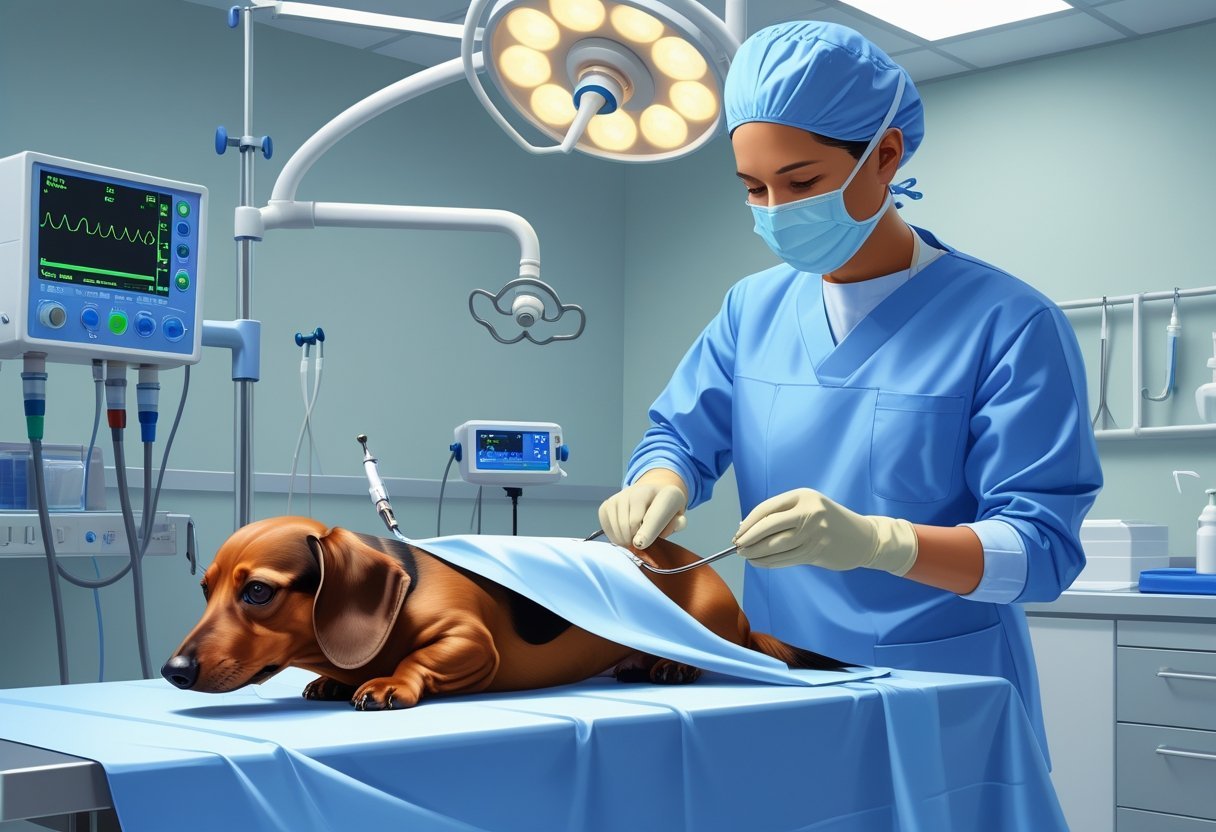Thinking about spaying your miniature dachshund? 🐾 It’s normal to have questions and a few worries.
Spaying helps prevent unwanted pregnancies 🐶 and can lower the risk of certain health problems 🏥.
Knowing what the procedure involves and how to look after your dog during recovery will help you make the best choice for your pet 💛.
Many owners wonder if spaying is safe and what to expect before, during, and after surgery 🩺. This article explains the procedure, the benefits for your dachshund, and how you can support a smooth recovery at home 🏡.
Key Takeaways 📌
- Spaying prevents unwanted litters and some health issues 🐕
- The procedure is safe with proper care and planning 🩺
- Recovery steps help your dog heal and stay healthy 🌿
🐾 Free Dachshund Care Guide
Download our free checklist to ensure your Dachshund stays happy, healthy, and well-loved!
Get Your Free Guide 🐶What Is Miniature Dachshund Spaying?
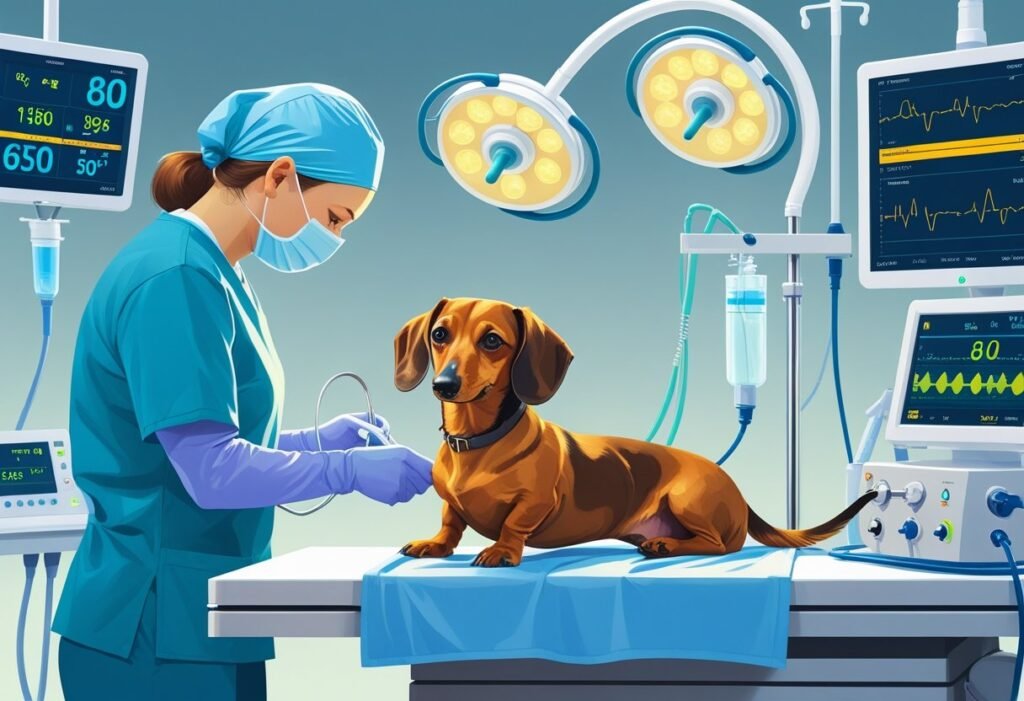
Spaying is a surgery that removes a female dog’s reproductive organs 🐶. It prevents pregnancy and stops the heat cycle 🛑.
Understanding the Spaying Process 🩺
During spaying, the vet removes the ovaries and usually the uterus 🐾. A veterinarian performs this surgery under general anesthesia 💉.
Your Dachshund needs to fast before surgery 🍽️. The vet might run blood tests to check her health 🧪.
The surgery itself usually lasts about an hour ⏱️. Afterward, your dog will have stitches or staples that need care 🧵.
Most Dachshunds can go home the same day 🚗. She should rest for 10-14 days 💤.
Keep her from licking the incision and follow your vet’s aftercare instructions 📋. It’s not always easy, but it’s important 💛.
Key Points
- Spaying is safe and common 🐕
- The recovery time is usually short ⏳
- Most dogs act normally within a few days 🌿

🥗 Wild Earth Vegan Dog Food – Gentle, Balanced Care After Spaying
A clean, plant-based formula that’s kind to your Dachshund’s digestion—perfect for maintaining a healthy weight and steady energy post-surgery.
- Supports weight control to protect your Doxie’s back and joints 🌿
- Complete nutrition without common allergens for sensitive tummies 🙂
- Great for portioning to match your vet’s recovery diet plan 🐾

Why Spaying Is Recommended 📌
Spaying stops your miniature Dachshund from going into heat and prevents unwanted litters 🍼. It can also lower the risk of certain health issues, like uterine infections and some cancers 🏥.
Behavior problems linked to the heat cycle, like roaming and yowling, may also get better 🐾. Early spaying can help prevent these concerns 🌟.
It also helps control the pet population, leading to fewer unwanted dogs in shelters 🏡. Veterinarians usually suggest spaying miniature Dachshunds around six months of age, but timing may vary based on your dog’s health and breed characteristics 📅.
Benefits of Spaying a Miniature Dachshund
Spaying your Miniature Dachshund can boost her health 🐾 and help with some unwanted behaviors 🌟. It can also make life easier for you as an owner 💛.
This routine surgery has specific benefits that can affect her life and your experience as a pet parent 🐶.
Health Advantages 🏥
Spaying greatly reduces the risk of uterine infections, like pyometra, which are common in unspayed females and can be life-threatening if left untreated ⚠️. It also lowers the chance of mammary (breast) tumors, especially if you spay before her first heat 🌿.
Removing her reproductive organs means your Dachshund won’t face the risk of ovarian or uterine cancer 🩺. Spaying prevents unexpected pregnancies, which can be risky for small breeds like Doxies 🐕.
Your dog’s lifespan may be longer thanks to reduced risk of some serious health problems 🎯. Routine vet visits and monitoring are still important after spaying 📋.
The surgery itself is usually safe when a licensed veterinarian does it ✅. Some minor health risks, like anesthesia complications, exist but are rare 💉.

🛡️ The Swiftest – Insurance Comparison
- Compare top plans in minutes for Dachshunds 📊
- See coverage for surgery, meds, and IVDD-related needs 🦴
- Find options that fit your post-spay budget 💰

🎨 Purr and Mutt Personalized Portrait
- Celebrate your Doxie with custom artwork 🐾
- Uplifting keepsake during recovery at home 🏡
- Great gift for devoted Dachshund parents 🎁
Behavioral Improvements 🐕
Spayed Miniature Dachshunds no longer go into heat 🌸. They won’t show heat-related behaviors like yowling, nervousness, or trying to escape to find a mate 🚪.
These changes can make your household calmer and less stressful 🏡. Spaying also reduces the chance your Dachshund will mark her territory with urine inside the house 💦.

Some females become more affectionate and less likely to show aggression or mood swings caused by hormonal changes ❤️. Because your Doxie won’t be attracting male dogs with her scent, you’re less likely to deal with unwanted visitors or risky encounters when out for walks 🚶♂️.
This lessens the strain of managing her during those times 🌟. It’s just a little less chaos, you know? 😊
Advantages for Owners 📌
Fixing your Miniature Dachshund can mean fewer costly vet bills in the future by avoiding treatments for serious illnesses like uterine infections and cancers 💰.
You won’t need to manage the mess or inconvenience of a female dog’s heat cycle, like spotting or unpredictable changes in behavior 🧹.
The chance of unplanned litters—and the challenges of finding homes for puppies—is completely removed 🍼. You may also find that your Doxie is easier to care for and travel with ✈️.
Boarding kennels and pet sitters often prefer or require dogs to be spayed, since it prevents problems that come with caring for dogs in season 🏨.
Table: Owner Benefits After Spaying
| Benefit | Description |
|---|---|
| Lower vet costs | Fewer health emergencies due to reduced risks |
| No heat cycles | Less mess and stress at home |
| No unexpected puppies | Avoid cost and responsibility of unwanted litters |
| Easier boarding | More options for travel and pet care |
Risks and Considerations Before Spaying
Spaying a Miniature Dachshund is a common medical procedure 🐾, but it’s important to know the possible surgical risks ⚠️, the best age to spay 📅, and unique Dachshund health needs 🐕.
Understanding each point will help you make an informed decision for your dog’s well-being 💛.
Potential Surgical Risks 🩺
Spaying is a surgery, so it carries some risks like any other operation 🏥. Some dogs may experience bleeding, infection, or swelling after the procedure 🌿.
Rarely, reactions to anesthesia can happen, which may lead to breathing or heart problems 💉. Obesity can raise the risk of surgical complications ⚠️.
Miniature Dachshunds have long spines that make extra care important during handling, so an experienced veterinarian is recommended 🐶. After surgery, you may also notice short-term changes like appetite loss, tiredness, or mild pain 😴.
- Choose a skilled vet familiar with Dachshunds 🐾
- Follow post-surgery care instructions 📋
- Watch for signs of infection (redness, discharge, or fever) 🩹

🍲 ChefPaw Fresh Food Maker
- Control ingredients for sensitive tummies 🌿
- Dial in recovery portions per vet advice ⚖️
- Batch-cook to keep routines stress-free ⏱️
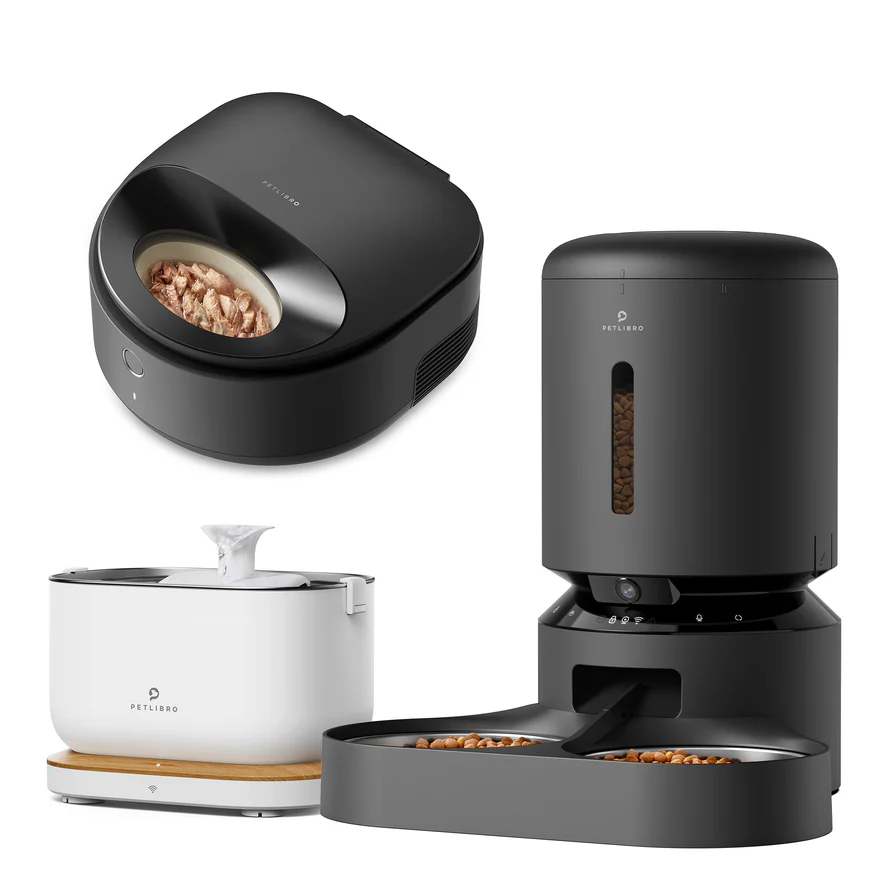
⏲️ Petlibro Automatic Feeder
- Keep meals on time while activity is limited 📅
- Small, consistent portions to support healing ✅
- Helps prevent begging and overfeeding 🍽️
Age and Timing Factors 📆
The age when you spay your Miniature Dachshund affects both recovery and long-term health 🌟. Many vets suggest spaying between 6 to 12 months old, before the first heat cycle 🐕.
Spaying before the first heat can lower the chance of mammary tumors and some infections 🌿. Waiting until after the first or second heat may slightly increase the risk of unwanted pregnancy 🍼 but is sometimes chosen if your dog has health issues or you plan to breed 🩺.

🎉 Grab your free Dachshund care checklist!
Spaying too early may cause growth or bone problems 🦴, so talk with your vet about the best time. Consider the following:
Table: Age and Spaying Considerations
| Age | Potential Benefits | Possible Risks |
|---|---|---|
| 6-12 months | Lower cancer risk | Growth concerns |
| Older | Fully grown | Higher complication risk |
Breed-Specific Considerations 🐕
Miniature Dachshunds have specific health concerns linked to their unique build 🏡. Their long backs make them more likely to suffer spinal issues like intervertebral disc disease (IVDD) 🩺.
Excess weight after spaying can put stress on their backs, raising the risk of injury or pain ⚠️. Some studies suggest Dachshunds may have a slightly higher risk of hormone-related problems after spaying, such as urinary incontinence 💧.
For Dachshund reproduction health, it’s also important to note that spaying ends your dog’s ability to breed 🚫 and removes future risks of uterine infections (pyometra) 🏥. Talk with your vet about special care for your Dachshund’s spine before and after surgery 🐾.
Keeping your dog at a healthy weight after spaying is important to help protect their back 🦴 and reduce future health issues 🌿.
Preparing Your Miniature Dachshund for Spaying
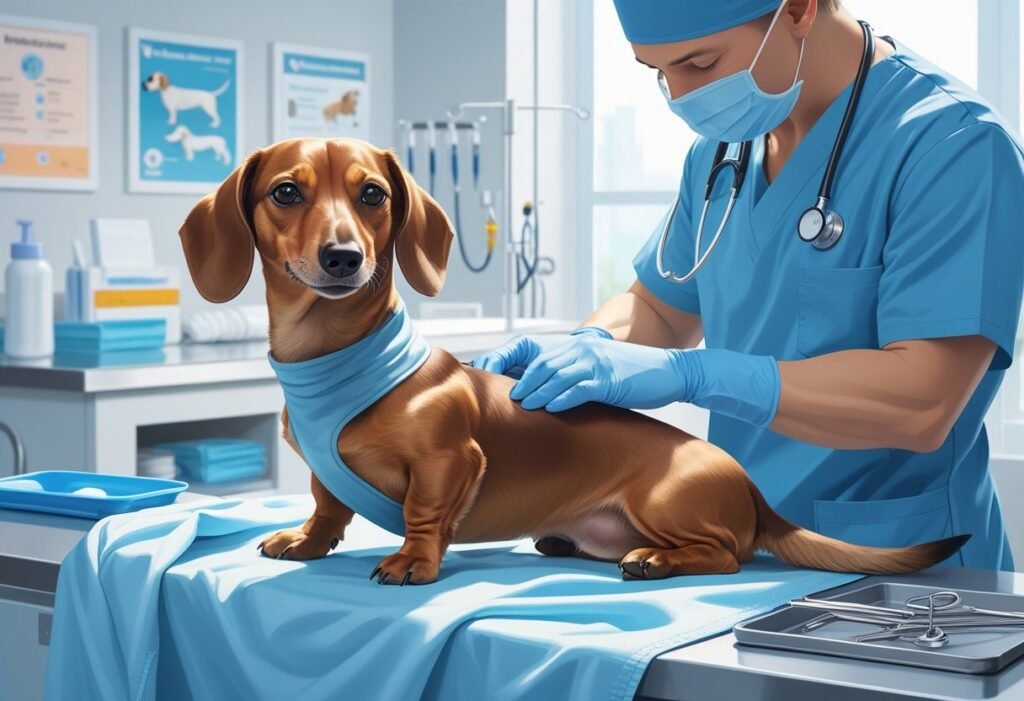
Getting your Miniature Dachshund ready for spaying takes careful planning 🗓️ and direction from your vet 🐾. Proper preparation helps the procedure go smoothly ✅ and lowers the risk of complications ⚠️.
Pre-Surgery Veterinary Assessment 🩺
Your vet will start with a physical exam to check your dog’s health 🐶. This may include listening to the heart and lungs ❤️ and checking for infections 🦠.
Blood tests are often recommended 🧪. These tests help detect issues like anemia, kidney disease, or clotting problems 🩸.
Your vet will ask about any medical history 📋, regular medications 💊, or allergies 🌿. You’ll need to mention any recent illnesses, changes in appetite, or concerns 🐾.
Vaccinations should be up to date before surgery 💉. If not, your vet will let you know which ones are needed 🛡️.
Table: Pre-Surgery Vet Steps
| Step | Why It’s Important |
|---|---|
| Physical Exam | Finds health issues that may affect surgery |
| Blood Work | Detects hidden conditions |
| Medical History | Plans for special needs or risks |
| Vaccine Check | Reduces infection risk |

🛏️ Majestic Pet Orthopedic Bed
- Offers firm yet gentle support during your Doxie’s recovery 💛
- Reduces pressure on joints and the surgical site after spaying 🩹
- Keeps your pup comfortable and calm through rest periods 💤

🪜 Majestic Pet Stairs
- Prevents jumping and strain after your Doxie’s spay surgery 🐾
- Helps your pup safely climb onto the couch or bed without pain 🧸
- A must-have for a smooth and stress-free recovery space 🌿
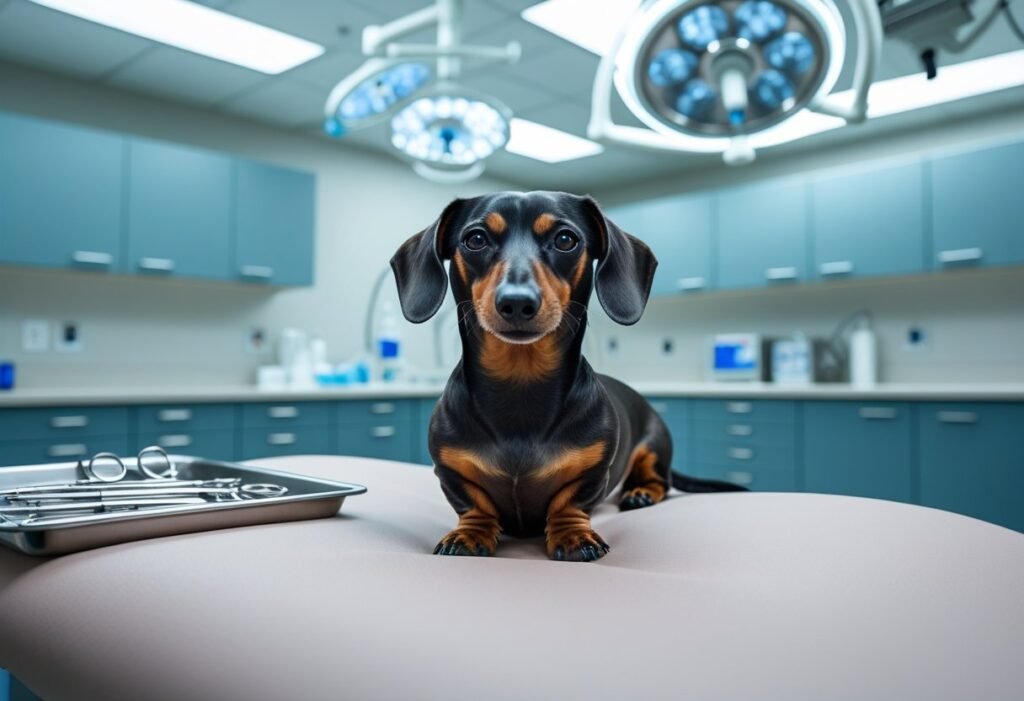
Fasting and Medication Guidelines 🍽️
Follow your vet’s fasting instructions before surgery 📋. Most dogs shouldn’t eat for 8 to 12 hours before a spay ⏱️.
Water is usually okay until a few hours before 🚰, but double-check with your vet 🐾. If your Miniature Dachshund takes daily medicine 💊, ask if you should give it on surgery day 📅.
Some medicines need to be skipped or adjusted ⚠️. Don’t give your dog treats or human food during fasting 🚫, since that can increase the risk of vomiting while under anesthesia 🛌.
Keep your dog’s stomach empty, but don’t fast her too long 🌿 — Miniature Dachshunds have sensitive digestion 💛. If you’re unsure, ask your vet to avoid any mix-ups 🐶.
The Spaying Procedure Step by Step
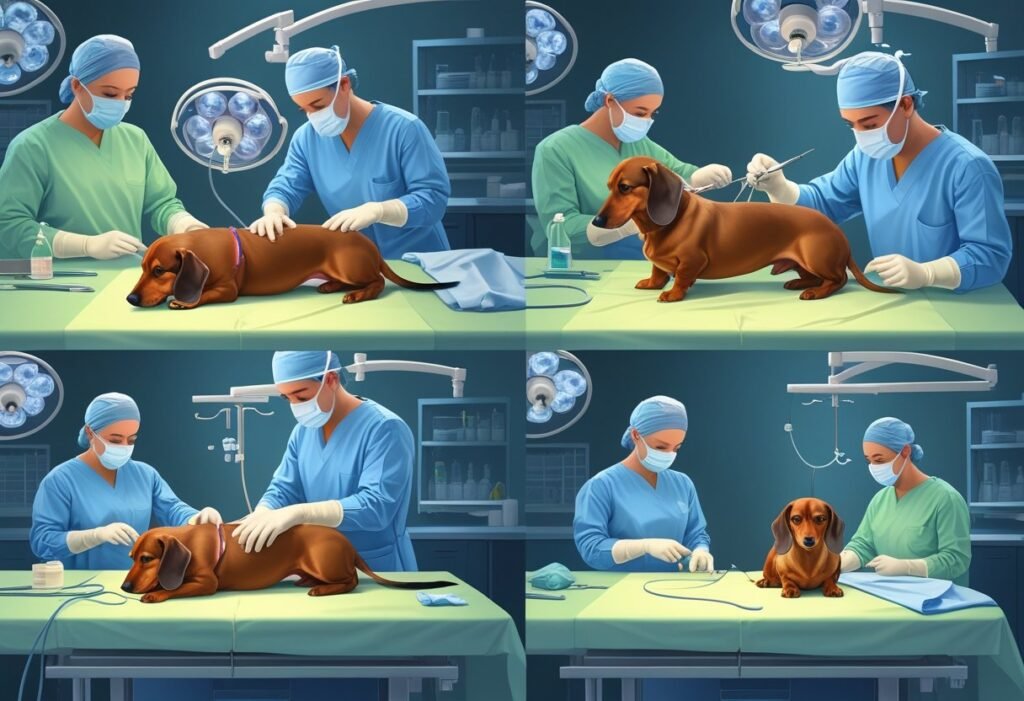
Spaying a miniature Dachshund involves careful steps to keep your dog safe and healthy 🐾. Trained veterinary staff handle each stage with special tools 🛠️ and constant monitoring 🩺.
Anesthesia and Monitoring 💉
The team weighs your miniature Dachshund to figure out the right anesthesia dose ⚖️. Before anesthesia, the vet usually does a quick health check 🐶 and may run blood tests for safety 🧪.
Once your dog is cleared, the vet gives anesthesia through an injection or mask 😷. Staff keep a close eye on heart rate ❤️, breathing 🌬️, and temperature 🌡️ the whole time. Machines track these signs to catch any problems early and help keep your dog safe ✅.
After surgery, your dog rests in a warm, safe spot 🛏️. Staff watch her as she wakes up, looking for pain or distress 💛.

🧪 AnimalBiome Gut Health Kit
- Understand your Doxie’s microbiome after meds 🔍
- Personalized diet guidance for steady digestion 🍽️
- Track improvements over time for long-term health 📈

💧 Zumalka Anxiety Relief
- Helps ease stress during the first recovery week 😌
- Pairs well with quiet time and crate rest 🏡
- Simple liquid dosing; follow your vet’s guidance 🩺
Surgical Process Explained 🐕
The vet shaves and cleans a small patch on your dog’s belly to lower infection risk 🧼. Your miniature Dachshund is moved to the surgery area and placed on her back 🛋️.
The vet makes a small incision in the abdomen to find the ovaries and uterus ✂️. Using sterile tools, the vet ties off blood vessels 🩸 and removes these organs so your dog won’t go into heat or get pregnant 🌸.
After removing the organs, the vet closes the incision with dissolvable stitches 🧵 or ones that need removal later 📅. The team checks for bleeding or swelling 🩹. They might apply ointment or a small bandage to help healing 🌿, and pain medicine is usually given for comfort 💊.
Post-Operative Care and Recovery
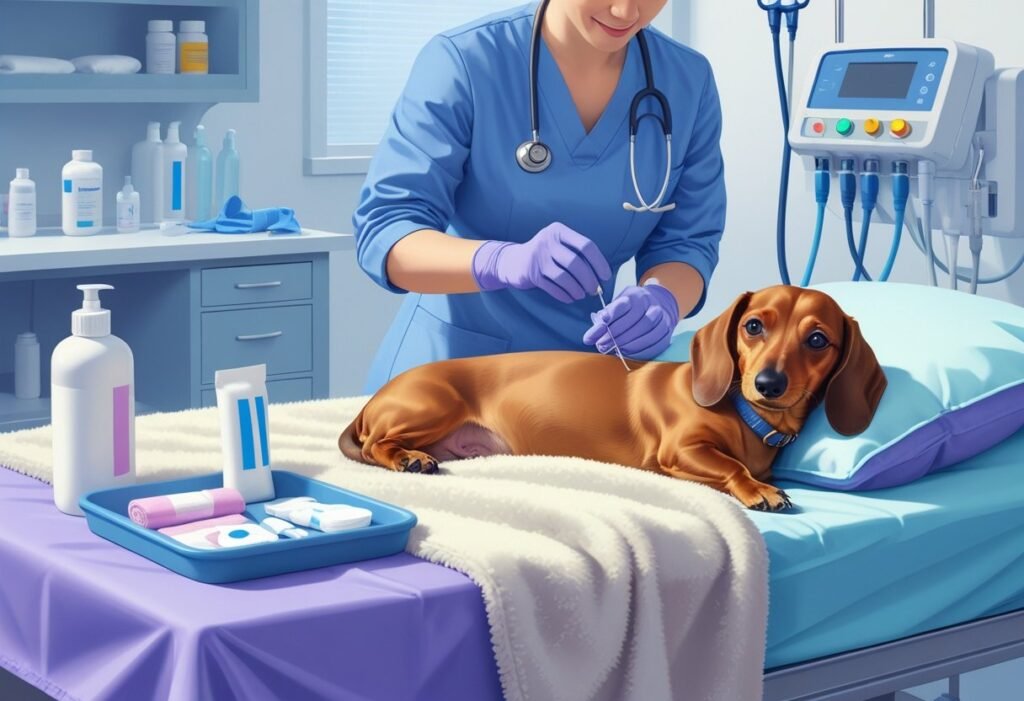
Your miniature dachshund needs special care at home after spaying 🏡. Taking the right steps helps her heal safely ✅ and lowers the chance of problems ⚠️.
Home Care Instructions 🐾
Keep your dog indoors and limit her activity for at least 10–14 days 📅. No running, jumping, or rough play — use a crate or small room if you need to 🚪.
Short, gentle leash walks are fine for bathroom breaks 🚶♂️. Check her incision twice a day, making sure stitches or glue stay clean and dry 🩹.
Don’t bathe your dog or let her swim until your vet says the wound is healed 🚫💦. Use an Elizabethan collar (cone) so she can’t lick or chew the incision 🐕.
Give medicines exactly as your vet prescribes 💊. Offer small meals and fresh water after surgery 🍽️💧. She might not eat much at first, but her appetite should come back within a day 🌿.

📹 Petcube Cam 360
- 360° view to check resting, cone use, and comfort 👀
- Two-way audio for reassurance when you’re out 🗣️
- Clear night vision for overnight monitoring 🌙
📍 Tractive GPS Tracker
- Real-time tracking for gentle leash walks 🚶♂️
- Safe zones with instant alerts around home 🏡
- Lightweight and waterproof for Doxies ✅
Monitoring for Complications 🩺
Watch for trouble, especially in the first week ⏱️. Call your vet if you see:
- Redness, swelling, or pus at the incision 🩹
- Bleeding from the wound 🩸
- Lethargy or hiding 😴
- Vomiting or diarrhea 🤢
- Loss of appetite that lasts more than 24 hours 🍽️
- Foul odor from the incision area 🦠
A little bruising or mild swelling can happen 🌟, but big changes need attention 🚨. If your vet asks, take your dachshund’s temperature 🌡️; a high fever means infection 🛑. If you’re unsure or the wound looks odd, just call your vet 📞. Better safe than sorry, right? 😊
Long-Term Health Impact of Spaying

Spaying a miniature dachshund can cut down on some health risks 🩺 and might even help your dog live longer 🌿. The procedure especially affects reproductive health and the risk of certain diseases 🐾.
Changes in Lifespan and Disease Prevention 📈
Spaying lowers the risk of mammary tumors in female dachshunds 🌸. Females spayed before their first heat have a much lower chance of developing these tumors later 🐕.
The procedure almost completely removes the risk of pyometra, a dangerous uterine infection ⚠️. Since the vet removes the reproductive organs, your dog can’t get ovarian or uterine cancer 🛡️.
Spayed dogs don’t go into heat 🚫, so you avoid behaviors and health worries tied to reproductive cycles 🐶. Some studies suggest spayed females may live a bit longer ⏳, probably because they dodge more reproductive diseases ✅.
On the flip side, spaying can slightly increase the risk for things like urinary incontinence 💧 and weight gain ⚖️. A good diet and regular exercise keep these risks in check 🏃♀️🥗.

🧠 Brain Training for Dogs
- Helps keep your Doxie mentally active and alert during recovery 🎯
- Improves focus and obedience through gentle, reward-based lessons 💡
- Perfect for low-activity days while your pup heals at home 🐾

🧴 Pride + Groom Grooming Tools Kit
- Helps keep your Dachshund’s coat soft and healthy during downtime ✨
- Gently removes loose fur and buildup without irritating healing skin 🪶
- Encourages bonding moments while keeping your pup clean and relaxed 💛
Spaying and Dachshund Reproduction Health
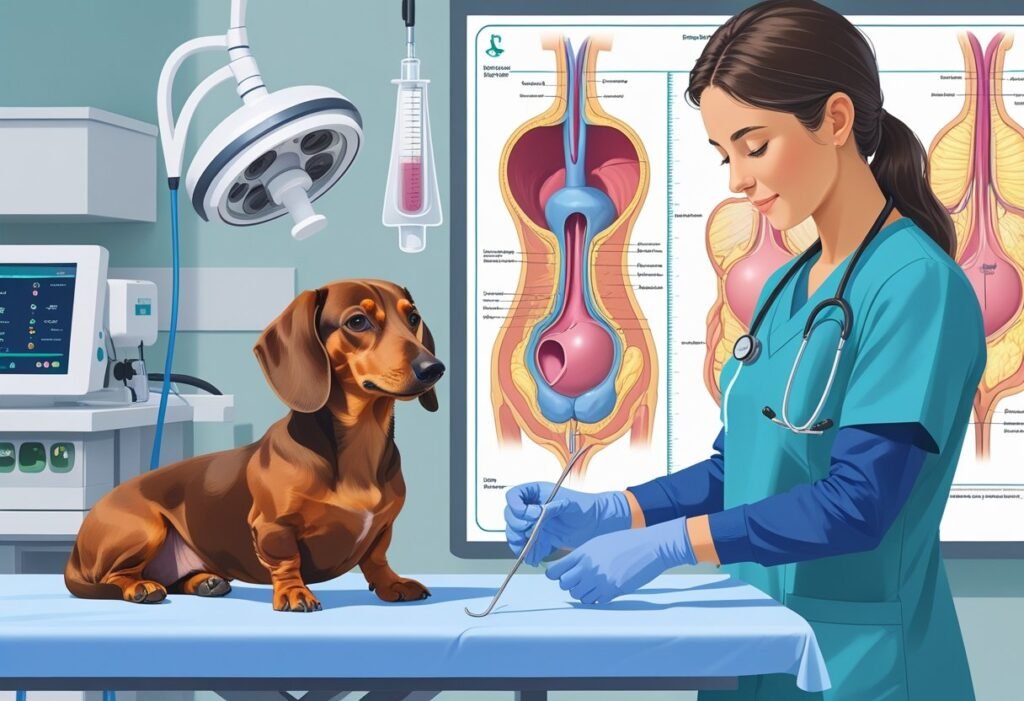
Spaying your miniature dachshund protects her health in several ways 🐾. It especially cuts down risks tied to her reproductive system 🩺 and helps you avoid some medical headaches later 💛.
Preventing Unplanned Pregnancies 🍼
Miniature dachshunds can get pregnant as early as six months old 📅. Spaying prevents unplanned litters, which matters because early pregnancy can stress small breeds 🐕 and cause health issues ⚠️.
Unplanned pregnancies mean more work — finding homes for puppies 🏡, plus a higher chance of birth complications, especially with dachshunds’ unique shape 🦴. Avoiding these risks helps you ensure your dog’s long-term health and well-being 🌿.
Spaying stops hormone cycles triggered by heat 🌸. You won’t have to deal with messy heat cycles 🧹 or sudden mood swings 😌, and you’ll avoid visits from determined male dogs looking for a mate 🚫🐶.
🌟 Post-Spay Care & Everyday Wellness Essentials for Your Doxie
- 💧 Petlibro Water Fountain — Encourage hydration during recovery and beyond with a steady stream of fresh, filtered water. Keeps your Doxie energized and supports healing 💦
- 📹 Petcube Bites 2 — Monitor your Doxie’s rest, recovery, and eating habits after surgery. Toss treats remotely to comfort and reward calm behavior 🎥
- 🧪 AnimalBiome Gut Restore Capsules — Strengthen your Dachshund’s gut health for better digestion, immunity, and energy after spaying or medication 💊
- 🎽 Embark Pet Adventure Harness — Provides gentle control and even pressure distribution for safe post-surgery walks. Keeps your Doxie secure and comfortable 🌿

Reducing Risk of Reproductive Cancers 🏥
Spaying lowers the risk of certain cancers 🎯. Uterine, ovarian, and mammary tumors show up more often in unspayed dogs 🩹.
Research shows females spayed before their first heat have a much lower risk of mammary cancer 📉. Mammary tumors are the most common cancer in unspayed females 🐾, and the risk jumps after just one or two heat cycles ⏱️.
Spaying also prevents deadly uterine infections like pyometra 🛑. These can strike suddenly and often need emergency surgery 🚨.
Table: Reproductive Health Risks and Spaying
| Health Risks | Unspayed | Spayed |
|---|---|---|
| Mammary tumors | High risk | Lowered risk |
| Uterine infections | Possible | Prevented |
| Ovarian cancer | Possible | Prevented |
Spaying is a straightforward step to make these serious health issues much less likely for your dachshund ✅.
Alternatives to Spaying
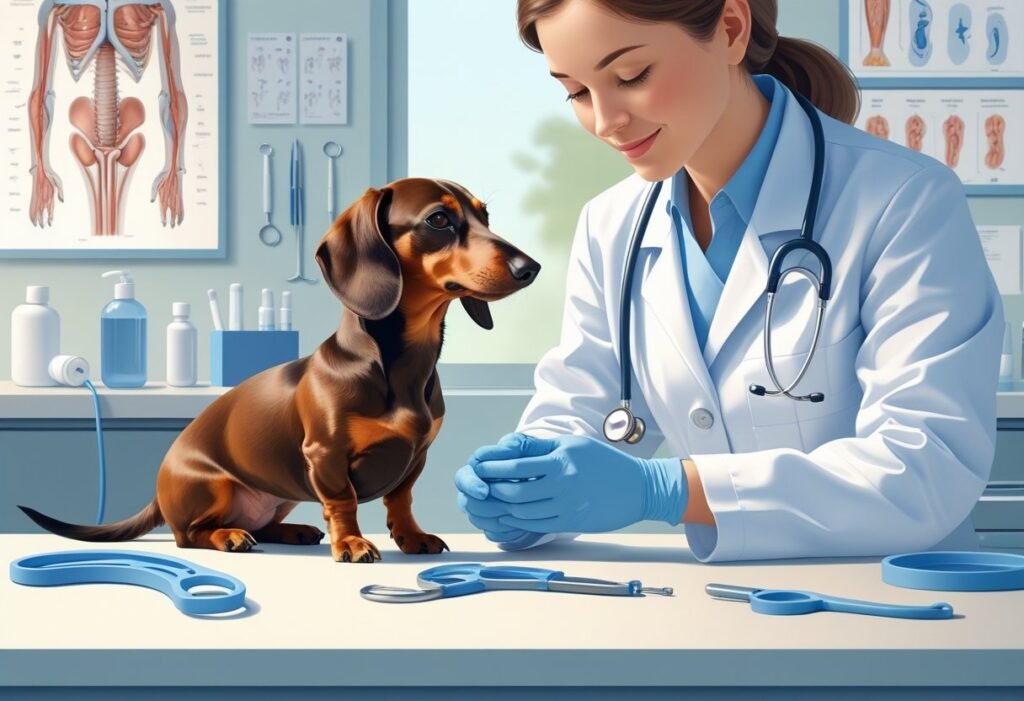
Not every Miniature Dachshund owner wants or can choose spaying 🐾. Some folks explore different medical or lifestyle options that fit their pet and situation 🌿.
Each choice comes with its own pros, cons, and daily demands 📋.
Medical Alternatives 🩺
If you want to skip spaying surgery, you’ve got a few medical options 💊. Ovariectomy removes just the ovaries — less invasive, but your dog still won’t go into heat 🚫🌸.
Another option is hormonal treatments, given as injections or tablets 💉. These can stop your dachshund from going into heat for a while ⏳, but side effects like weight gain ⚖️ or higher infection risk 🦠 are common.
Ovary-sparing hysterectomy is a third route ✂️. This surgery removes the uterus but keeps the ovaries, so your dog can’t get pregnant 🚫🍼 but will still go into heat 🌸. She may still show heat behaviors 😌, and there’s still a risk of some ovarian health issues 🩹.
Table: Spay Alternatives Overview
| Option | Fertility | Heat Cycles | Main Risks |
|---|---|---|---|
| Ovariectomy | No | No | Surgical risks |
| Hormonal Treatments | Yes | Suppressed | Side effects |
| Ovary-Sparing Hysterectomy | No | Yes | Ovarian diseases |
💛 Gentle Care Essentials for Recovery & Everyday Wellness
- 🎽 Coastal Pet Harness (IVDD Version) – A secure, no-pull design that protects your Dachshund’s back and chest, especially important during post-spay walks or gentle outdoor time.
- 🧴 Pride + Groom “The Sensitive One” Shampoo – A delicate, hydrating formula designed for sensitive skin. Perfect for post-surgery baths or maintaining coat health while healing.
- 🌿 Innovet PurCBD Oil – Promotes calmness, reduces inflammation, and supports recovery after spaying. A natural supplement for balanced wellness and pain relief.
- 🛁 King Klean Dog Shampoo – Keep your Doxie’s coat soft, shiny, and fresh with this all-natural, soothing shampoo — perfect for gentle home grooming sessions.
- 👕 Dog is Good Apparel & Gifts – Celebrate your Dachshund’s resilience and love with stylish, fun gifts that showcase the bond you share through every stage of care.
🩺 These recovery-friendly essentials keep your Doxie clean, calm, and cared for — supporting smooth healing and long-term health with every gentle touch.

Deciding What’s Best for Your Doxie 📌
Your mini dachshund’s age, health, and lifestyle all matter here 🐶. Dogs in good shape usually handle surgery better ✅, but those with health issues might need non-surgical options 🌟.
If you skip spaying, think about managing a dog in heat 🐕. That means extra cleaning 🧹, keeping male dogs away 🚪, and handling mood swings 😬. It’s not always easy ⚠️.
Talk with your vet about breed risks 🩺. Mini dachshunds have their own set of health issues, so your vet may lean toward certain options 📋. Check the latest advice before you decide 📅.
Weigh the costs — both time and money 💰. Hormonal treatments mean more vet visits 🏥, while surgery is a bigger upfront expense but less hassle later 🛠️. There’s no one-size-fits-all answer, but the right choice is what works for you and your dachshund ❤️.
🐾 Don’t Miss Out!
Download our free Dachshund care guide to keep your furry friend happy and healthy.
Get Your Free Guide 🐶Frequently Asked Questions

Spaying a Miniature Dachshund can affect her health 🩺, behavior 🐾, and future care 🏡. Costs and recovery times vary 📅, and it’s important to know about possible side effects ⚠️ and the best age for the procedure 📋.
What are the pros and cons of spaying a female Dachshund? 📌
Spaying prevents unwanted litters 🍼 and can lower the risk of some cancers and infections, like pyometra 🛡️. It usually stops heat cycles 🚫🌸, which are messy 🧹 and tend to attract male dogs 🐶.
But spaying is still surgery ✂️, so there’s a chance of infection 🦠 or a bad reaction to anesthesia 💉. Some dogs might put on extra weight ⚖️ if you don’t keep an eye on their diet and exercise 🥗🏃♂️.
What is the typical recovery time for a Miniature Dachshund after a spaying procedure? ⏱️
Most Dachshunds bounce back from spaying in about 10 to 14 days 📅. You’ll want to keep your dog calm 😌 and limit activity during recovery 🚪.
Check the incision for swelling or redness 🩹. Vets often send dogs home with pain meds 💊, and some pups seem a bit tired 😴 or off their food for a day or two 🍽️.
What can I expect to pay for spaying my Miniature Dachshund? 💰
Spaying can cost anywhere from $100 to $500 💵, depending on your location 📍 and the clinic 🏥. City clinics usually charge more than those in rural areas 🌾.
Some low-cost clinics and animal shelters offer discounts 🎟️. If your dog needs extra care or tests 🧪, expect the price to go up a bit 📈.
Are there any potential side effects I should watch for after spaying my dog? 🩺
You might notice mild swelling, redness, or bruising near the incision 🌸. Many dogs act sleepy 😴 or eat less after surgery 🍽️.
If you see heavy bleeding 🩸, pus 🦠, serious swelling ⚠️, or your dog can’t stand or eat 🚫🐶, call your vet right away 📞.
At what age should a Miniature Dachshund typically be spayed? 📅
Most vets suggest spaying between 6 and 12 months old 🐾. Some recommend waiting until your dog finishes growing 🌟, especially for tiny pups 🐕.
It’s really worth chatting with your vet 🩺, since they’ll know what’s safest for your particular dog ❤️.
Do female Miniature Dachshunds exhibit behavioral changes after spaying? 🐶
Some female Dachshunds might seem calmer 😌 after spaying, especially if they acted restless during heat cycles 🌸.
Most of the time, their core personality doesn’t really change 🌿.
Spaying usually doesn’t make dogs less friendly 🤗 or sap their energy ⚡. Sometimes you’ll notice changes, but that’s often just them recovering from surgery ⏳, not the spaying itself.

